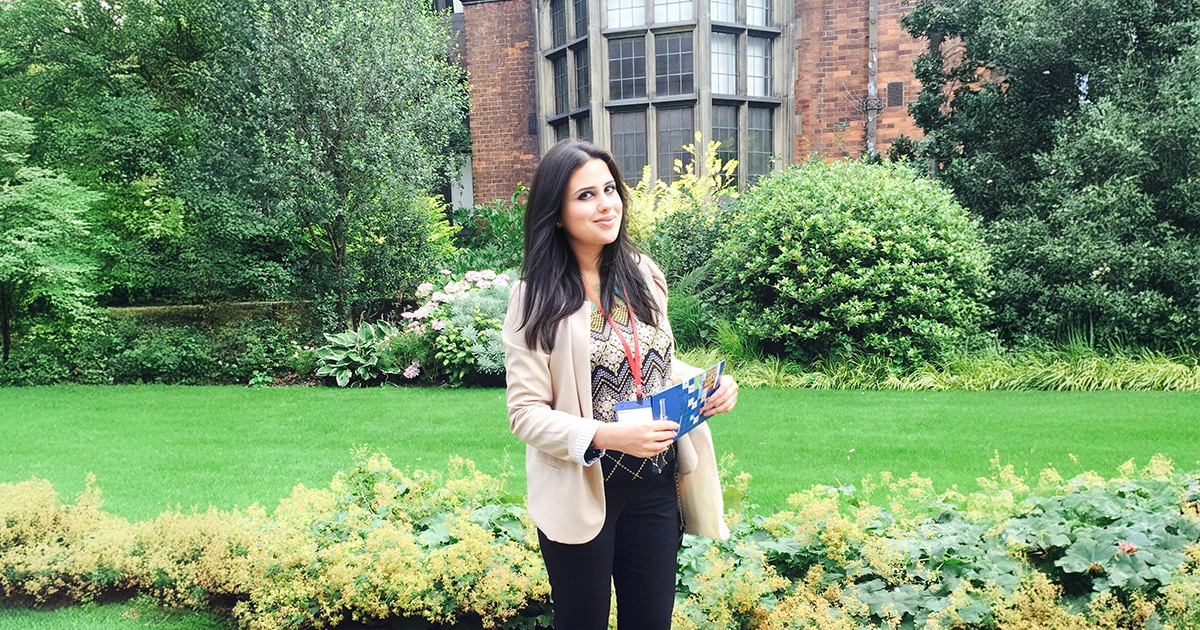From a Bold First Step at LAU to a Global Impact in Research
Collaboration with a faculty member and mentorship at LAU helped to define alumna Sophie Lythreatis’ academic career and research interest in digital inclusion.
“It just did not feel like the right fit for me,” she recalls. “After that lecture, I walked over to the registrar’s office, submitted a petition, and changed my major to business—all on the first day.”
That decisive move marked the beginning of a remarkable academic and professional evolution. What started with a shift in direction at LAU eventually led her to Oxford University and Bristol University, and ultimately, to contributing to global conversations on the digital divide—disparities in information and communications technology access, usage, and outcomes.
She completed her undergraduate degree in business in 2010 and quickly found herself in a fast-paced role in Lebanon’s banking sector. By all accounts, she was on a promising track.
“But something was missing,” she says. “The job was good, the salary was fine, but I didn’t feel like I was doing what I was supposed to do.”
Craving more purpose, she returned to LAU to pursue an MBA. There, she met Dr. Abdul-Nasser Kassar, a professor at the Adnan Kassar School of Business, whose class in quantitative analysis sparked a new interest in Dr. Lythreatis. “I remember how much I enjoyed that course—it challenged me and made sense. I was motivated to dive deeper, and that curiosity changed everything,” she says.
Dr. Lythreatis asked Dr. Kassar to supervise her thesis. That collaboration flourished into her first academic paper, her first real taste of research, and the beginning of a lasting mentorship.
“That was the moment I knew I wanted to be a researcher,” she says. “I left my banking job, joined LAU full-time as a research assistant, and never looked back.”
Supported and encouraged by Dr. Kassar, she applied to a PhD program at the University of Bristol. Within six months, she was on a plane, embarking on the next phase of her academic career.
Three years later, PhD in hand, she accepted a postdoctoral position at the University of Oxford. Not long after, a new chapter opened professionally and personally: she married and returned to the University of Bristol, where she now teaches business analytics and mentors emerging researchers.
She was also named the first official research fellow of the Bristol Digital Futures Institute—a £100 million interdisciplinary institute focused on creating inclusive and sustainable digital futures.
“We work with our partners from BT Group, Airbus, Toshiba and others in the institute on transformative approaches to digital technology; this is all about the future and the next steps to attain technology in a way by which it is sustainable, ethical, beneficial and accessible for organizations and individuals. We are rethinking what it means to innovate with people at the center,” Dr. Lythreatis explains. “It’s not just about the latest technology, it’s about who benefits from it and how.”
Her most impactful research, co-authored with Dr. Kassar, explores the digital divide through a multidimensional lens: not just access to technology but also the skills to use it and the outcomes it enables. Recently, they have been investigating a potential new layer of that divide, which emerges in the age of AI, involving awareness, control, and digital agency.
The paper caught international attention; it was cited by the United Nations, the Organization for Economic Cooperation and Development (OECD), 12 news outlets and a range of academic journals. It ranks among the top 5 percent of research globally in attention score and influence.
“In a poetic twist, Dr. Kassar unknowingly blind-reviewed and approved one of my papers years later, discovering my authorship only after publication. I still laugh about that. It felt like the universe coming full circle,” says Dr. Lythreatis.
Today, she continues to collaborate with LAU on research and funding proposals, not just professionally but from a place of deep gratitude.
“LAU gave me space to explore, grow, and find my path. I will always be connected to it because LAU, Dr. Kassar and our research team changed my life,” she adds.
From a confident pivot on day one to shaping digital policy on a global scale, Dr. Lythreatis says LAU will remain her go-to organization for external research collaboration. Her story is a testament to the power of self-discovery, mentorship, academic courage and loyalty to where it all started.
